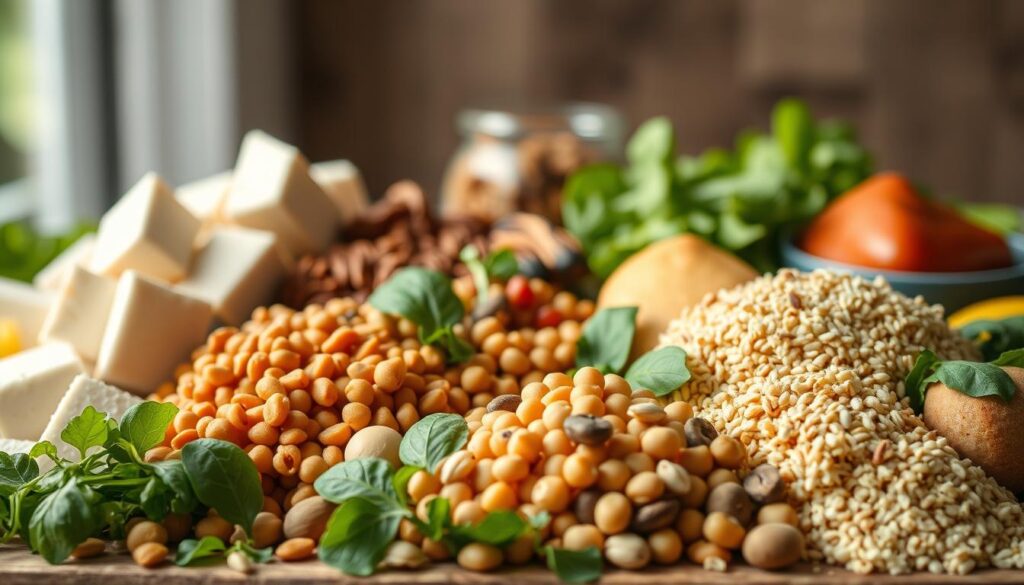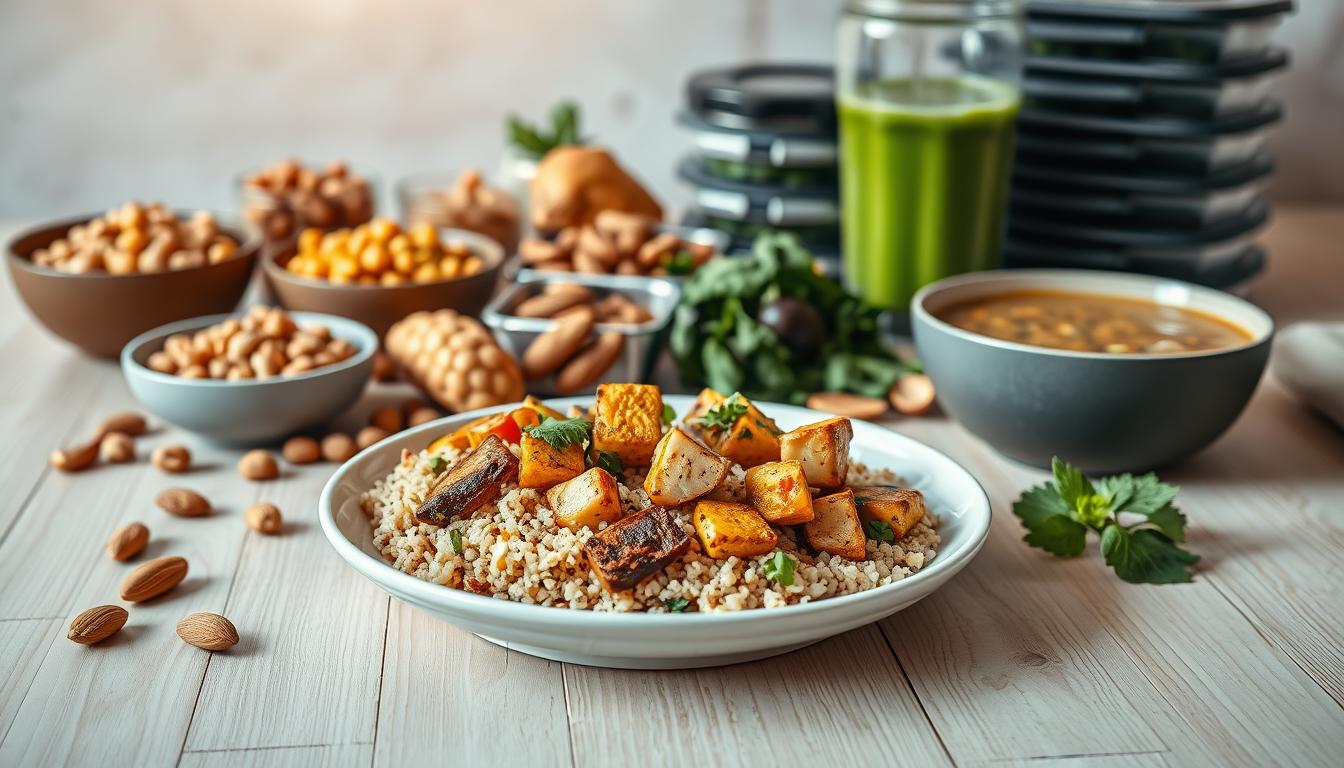A well-planned vegan bodybuilding meal plan is crucial for athletes looking to build muscle without consuming animal products. Despite common misconceptions, a vegan diet can provide all the necessary nutrients for muscle growth.
Did you know that many professional athletes thrive on a plant-based diet? With the right combination of foods, vegans can meet their daily protein needs and achieve impressive muscle gains.
To achieve muscle gain, it’s essential to understand how to optimize your diet with high protein vegan meals. This article will guide you through the best options and provide a comprehensive overview of how to support your fitness goals with a well-planned vegan diet.
Key Takeaways
- Understanding the importance of protein in a vegan diet for muscle building
- Identifying high protein vegan foods for muscle gain
- Creating a well-planned vegan bodybuilding meal plan
- Optimizing your diet for muscle growth on a vegan diet
- Achieving fitness goals with a balanced vegan diet
The Science Behind Vegan Protein and Muscle Building
The science behind vegan protein and muscle building debunks common myths about plant-based diets. Understanding how vegan protein contributes to muscle growth is crucial for those looking to adopt a plant-based lifestyle without sacrificing their fitness goals.

Protein Requirements for Muscle Growth
To build muscle, it’s essential to consume enough protein to support muscle repair and growth. The daily protein requirement varies based on factors such as age, weight, and activity level. Generally, 1.2 to 1.6 grams of protein per kilogram of body weight is recommended for individuals looking to build muscle.
A list of high protein vegan foods includes:
- Legumes such as lentils and chickpeas
- Nuts and seeds like almonds and chia seeds
- Whole grains including quinoa and brown rice
- Tofu and tempeh
Complete vs. Incomplete Protein Sources
Vegan protein sources are often categorized as complete or incomplete based on their amino acid profile. Complete proteins contain all nine essential amino acids, while incomplete proteins lack one or more. Examples of complete vegan protein sources include quinoa and chia seeds. Incomplete protein sources, such as legumes, can be paired with other foods to provide all essential amino acids.
For instance, pairing legumes with grains can create a complete protein profile, supporting muscle growth and repair. Understanding the difference between complete and incomplete proteins helps vegans plan their diet effectively to meet their protein needs.
Essential High Protein Vegan Foods for Muscle Gain
Building muscle on a vegan diet requires a strategic approach to consuming high protein foods. A variety of plant-based options can provide the necessary protein for muscle growth and repair.
Legumes and Beans
Legumes and beans are among the richest sources of protein in a vegan diet. Foods like lentils, chickpeas, and black beans are not only high in protein but also rich in fiber, iron, and other essential nutrients. For example, one cup of cooked lentils contains about 18g of protein.
Tofu, Tempeh, and Seitan
Tofu, tempeh, and seitan are versatile protein sources that can be incorporated into a variety of dishes. Tofu, made from soybeans, is an excellent protein source with about 20g of protein per 3-ounce serving. Tempeh, a fermented soybean product, offers a nutty flavor and is rich in probiotics. Seitan, made from wheat gluten, provides a meat-like texture and is high in protein.
Nuts, Seeds, and Whole Grains
Nuts and seeds, such as almonds, chia seeds, and hemp seeds, are not only high in healthy fats but also provide a significant amount of protein. Whole grains like quinoa and farro are complete proteins, meaning they contain all nine essential amino acids necessary for muscle growth.
Plant-Based Protein Supplements
For those who need an extra boost, plant-based protein supplements like pea protein, hemp protein, and brown rice protein can be convenient and effective. These supplements can be especially useful post-workout to aid in muscle recovery.
| Food | Protein Content per Serving | Nutritional Benefits |
|---|---|---|
| Lentils | 18g per cup | Rich in iron, fiber |
| Tofu | 20g per 3 oz serving | Versatile, rich in calcium |
| Chia Seeds | 5g per ounce | Rich in omega-3, fiber |
| Quinoa | 8g per cup | Complete protein, rich in iron |
High Protein Vegan Meals for Muscle Gain: Recipes and Meal Plans
To support muscle growth on a vegan diet, it’s essential to consume high protein meals that are both nutritious and delicious. A well-planned vegan diet can provide all the necessary nutrients for muscle gain, and with the right recipes, you can achieve your fitness goals without compromising your dietary preferences.
Protein-Packed Vegan Breakfasts
Starting your day with a protein-rich breakfast is crucial for muscle gain. Here are some delicious and nutritious options:
Tofu Scramble Power Bowl
A tofu scramble made with turmeric, nutritional yeast, and spinach, served with quinoa and avocado, provides a boost of protein and healthy fats.
Protein-Boosted Overnight Oats
Mixing hemp seeds, chia seeds, and vegan protein powder with oats and almond milk creates a nutritious breakfast that’s high in protein and fiber.
Muscle-Building Vegan Lunches
For lunch, focus on meals that combine protein sources with complex carbohydrates and healthy fats. Here are some ideas:
Lentil and Quinoa Protein Bowl
A bowl filled with cooked lentils, quinoa, roasted vegetables, and a drizzle of tahini sauce is a complete meal that supports muscle growth.
Tempeh and Vegetable Wrap
Wrapping tempeh, mixed vegetables, and hummus in a whole grain wrap provides a balanced mix of protein, carbs, and healthy fats.
Protein-Rich Vegan Dinners
Dinner is an opportunity to consume a significant amount of protein to aid in muscle recovery and growth. Consider these options:
Chickpea and Seitan Stir-Fry
A stir-fry made with chickpeas, seitan, and a variety of vegetables, cooked in a savory sauce and served over brown rice, is a protein-packed meal.
Three-Bean Protein Chili
A hearty chili made with three types of beans (kidney beans, black beans, and chickpeas) and served with whole grain cornbread is a satisfying and protein-rich dinner.
Post-Workout Recovery Snacks
After a workout, it’s crucial to consume a snack that’s high in protein and carbohydrates to aid in recovery. Some options include:
| Snack | Protein Content | Carbohydrate Content |
|---|---|---|
| Vegan Protein Shake with Banana | 20 grams | 30 grams |
| Apple Slices with Almond Butter and Chia Seeds | 8 grams | 20 grams |
7-Day Vegan Muscle Building Meal Plan
Developing a vegan muscle building meal plan that works involves setting the right daily nutritional targets. To achieve muscle gain, it’s essential to consume sufficient protein and calories. Here’s how to create a effective 7-day vegan meal plan.
Setting Your Daily Protein and Calorie Targets
To build muscle, you need to be in a calorie surplus, meaning you consume more calories than you burn. For vegans, the daily calorie target can vary from 2,500 to 3,500 calories, depending on factors like age, weight, and activity level. Protein intake is also crucial, with a recommended daily intake of 1.2-1.6 grams of protein per kilogram of body weight.
For example, if you weigh 70 kilograms, your daily protein target would be 84-112 grams. You can achieve this by consuming protein-rich foods like legumes, tofu, tempeh, and plant-based protein supplements.
| Activity Level | Daily Calorie Target | Daily Protein Target (per kg body weight) |
|---|---|---|
| Sedentary | 2,500 | 1.2g |
| Moderately Active | 3,000 | 1.4g |
| Very Active | 3,500 | 1.6g |
Complete Weekly Meal Plan
Here’s a sample 7-day vegan meal plan that can help you achieve your muscle-building goals:
- Monday: Oatmeal with almond milk and banana for breakfast, lentil soup with quinoa for lunch, and tofu stir-fry with brown rice for dinner.
- Tuesday: Smoothie bowl with protein powder, spinach, and almond milk for breakfast, chickpea salad with whole grain bread for lunch, and tempeh curry with brown rice for dinner.
- Wednesday: Whole grain toast with avocado and scrambled tofu for breakfast, vegan wrap with hummus and vegetables for lunch, and seitan with roasted vegetables for dinner.
- Thursday: Overnight oats with almond milk and berries for breakfast, lentil and vegetable stew for lunch, and tofu with quinoa and steamed broccoli for dinner.
- Friday: Smoothie with banana, spinach, and plant-based protein powder for breakfast, chickpea and quinoa bowl with roasted vegetables for lunch, and vegan stir-fry with tofu and brown rice for dinner.
- Saturday: Whole grain pancakes with almond butter and maple syrup for breakfast, lentil soup with whole grain bread for lunch, and tempeh with roasted sweet potatoes for dinner.
- Sunday: Breakfast burrito with scrambled tofu and avocado for breakfast, vegan salad with chickpeas and whole grain crackers for lunch, and seitan with quinoa and steamed asparagus for dinner.
Grocery Shopping List and Meal Prep Tips
To make the most of your vegan meal plan, it’s essential to plan your grocery shopping and meal prep. Here are some tips:
- Make a list of the ingredients you need for the week and stick to it.
- Buy in bulk to save money and reduce waste.
- Prep your meals in advance to save time during the week.
- Cook in bulk and freeze meals for later use.
By following this 7-day vegan muscle building meal plan, you can ensure that you’re getting the nutrients you need to support muscle growth and overall health.
Building Muscle on a Vegan Diet: Made Easy
A well-planned muscle-building vegan diet is not only effective but also offers a variety of delicious and nutritious options. By incorporating protein-rich vegan meals into your daily routine, you can achieve your muscle gain goals while enjoying the benefits of a plant-based lifestyle.
The key to success lies in understanding your protein requirements and choosing from a wide range of high protein vegan foods, including legumes, beans, tofu, tempeh, seitan, nuts, seeds, and whole grains. With the meal plans and recipes provided, you can create a personalized diet that suits your needs and preferences.
Embracing a muscle-building vegan diet is a journey that requires patience, dedication, and creativity. By exploring the many options available and staying committed to your goals, you can achieve impressive results and enjoy the many benefits of a vegan lifestyle.
